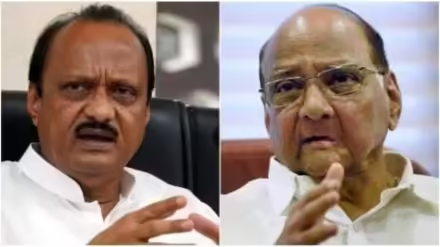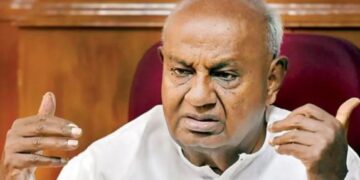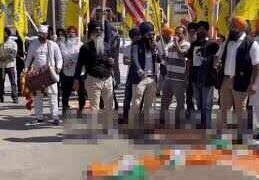Leader of the Opposition Mallikarjun Kharge and Rahul Gandhi had registered their disagreement over the selection of the Chairperson and members of the National Human Rights Commission, on the grounds that the process adopted was “fundamentally flawed” and a “pre-determined” exercise, without mutual consultation. And the consensus was ignored.
He had proposed the names of Justice Rohinton Fali Nariman and Justice Kuttiyal Mathew Joseph for the post of Chairman. However, former Supreme Court judge V Ramasubramaniam has been appointed as the new chairman of NHRC.
The post of NHRC Chairman was lying vacant after Justice (retd) Arun Kumar Mishra completed his tenure on June 1. The selection committee meeting to choose the chairperson and members of the NHRC was held on December 18 at the Parliament House.
In their dissent letter, Kharge and Gandhi expressed their disagreement on the grounds that the selection process adopted by the committee was fundamentally flawed.
Their dissent note said, “This was a premeditated exercise, ignoring the established tradition of mutual consultation and consensus, which is necessary in such cases. This deviation undermines the principles of fairness and impartiality, Which is important for the credibility of the selection committee.”
Kharge and Gandhi said that instead of promoting deliberations and ensuring collective decisions, the committee relied on numerical majority to finalize the names and ignored legitimate concerns and viewpoints raised during the meeting.
He said that NHRC is an important statutory body whose mandate is to protect the fundamental human rights of all citizens, especially the oppressed and marginalized sections of the society.
Their dissent note read, “Its ability to fulfill this mandate depends largely on the inclusivity and representativeness of its composition. A diverse leadership ensures that the NHRC is most responsive to diverse communities, particularly human rights violations.” We have nominated Justice Rohinton Fali Nariman and Justice Mathew Joseph for the post of Chairperson, keeping in mind the unique challenges faced by more vulnerable communities. Proposed.”
He said, “Justice Rohinton Fali Nariman, an eminent jurist from the minority Parsi community, is renowned for his intellectual depth and unwavering commitment to constitutional values. His induction sends a strong message about the NHRC’s commitment to represent India’s pluralistic society.” The message will go.”
Kharge and Gandhi said, “Similarly, Justice Joseph, a former Supreme Court judge who belongs to the minority Christian community, has consistently delivered judgments that emphasize individual liberty and protection of marginalized groups, making him an important He is an ideal candidate for the position.”
“Furthermore, for the post of Members, we have recommended the names of Justice S. Muralidhar and Justice Akil Abdul Hameed Kureshi, both of whom have exemplary records in upholding human rights,” he said.
The two leaders said Justice Muralidhar is widely respected for his landmark judgments advancing social justice, including his work on custodial violence and the protection of civil liberties, and the justices’ dealings with the Muslim minority community. Qureshi has consistently defended constitutional principles and demonstrated a strong commitment to accountability in governance.
The dissent note said their inclusion would contribute to the NHRC’s effectiveness and its commitment to diversity.
It said that while merit is undoubtedly the primary criterion, it is equally important to maintain a balance that reflects the regional, caste, community and religious diversity of the country.
The dissent note said, “This balance ensures that the NHRC operates with an inclusive approach and is sensitive to the experiences of all sections of the society. By neglecting this important principle, the Committee is eroding public confidence in this prestigious institution.” “Is taking a risk.”
The dissent note dated December 18 said, “Finally, the negative approach adopted towards these views by the majority of the Select Committee in today’s meeting is extremely regrettable. The diversity that defines the constitutional character of India is critical to the credibility and effectiveness of the NHRC.” And depends on its ability to realize inclusivity.”
Kharge and Gandhi said, “The names we have proposed reflect this spirit and are in line with the fundamental principles of the Commission. Their exclusion raises serious concerns about the fairness and equity of the selection process.”
On December 18, a high-level committee chaired by Prime Minister Narendra Modi met to select the next chairperson of the NHRC. A former Chief Justice of India or a retired judge of the Supreme Court is appointed Chairman of the NHRC by the President on the recommendation of the Selection Committee.
Former Supreme Court judge Justice (retd) Ramasubramanian has been appointed Chairman of the National Human Rights Commission. Former Chief Justices H L Dattu and K G Balakrishnan are among those who have headed the rights body in the past.
NHRC said in a post on Has been appointed.”
Kanungo had earlier served as the chairman of the National Commission for Protection of Child Rights (NCPCR). Congress president Kharge and Gandhi attended the meeting as Leader of the Opposition (LOP) in the Rajya Sabha and Lok Sabha respectively.
According to the law governing the NHRC, the committee to select the NHRC chief is chaired by the Prime Minister, and has the Speaker of the Lok Sabha, the Home Minister, the Leader of the Opposition in the Lok Sabha, the Leader of the Opposition in the Rajya Sabha and the Deputy Chairman of the Rajya Sabha as its members.






